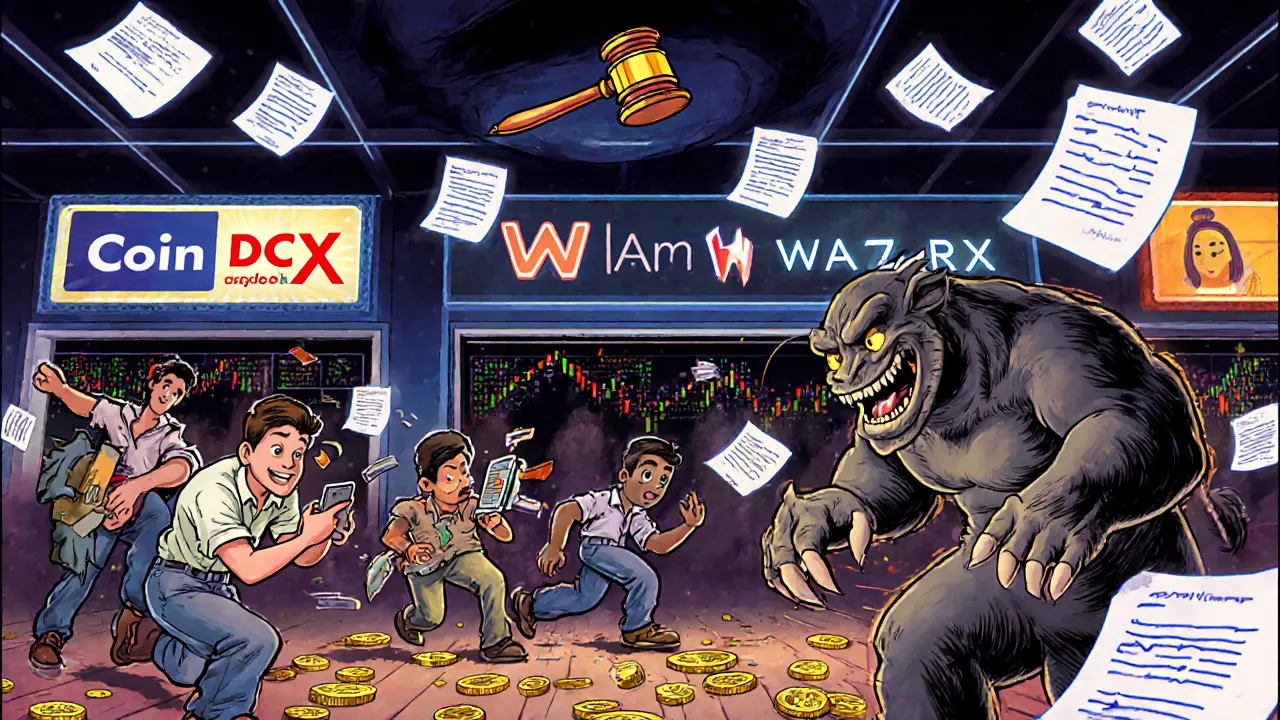India's Unregulated Crypto Status: Risks and Opportunities for Traders in 2025

Oct, 31 2025
India Crypto Tax Calculator
Calculate Your Tax Liability
Key Tax Information
India's crypto tax rate is 30% flat on gains (no distinction between short-term and long-term holdings).
Additionally, a 1% TDS is deducted on every trade transaction.
Source: Ministry of Finance, India
Your Tax Breakdown
Calculate your tax liability to understand the true impact of India's crypto regulations.
India’s crypto market is a paradox. Millions trade Bitcoin, Ethereum, and altcoins every day. Exchanges like CoinDCX and WazirX handle billions in monthly volume. Yet, there’s no clear law saying it’s legal-or illegal. As of October 2025, cryptocurrency in India exists in a legal grey zone: not banned, not regulated, just taxed. For traders, that means opportunity wrapped in uncertainty.
What Does ‘Unregulated’ Actually Mean for Traders?
When people say crypto is unregulated in India, they don’t mean it’s lawless. It means the government hasn’t created a framework to protect you or define your rights. There’s no licensing for exchanges. No insurance for lost funds. No official recourse if a platform shuts down. The only thing the government has clearly defined is how much tax you owe. The 30% flat tax on crypto gains isn’t just high-it’s unusual. In most countries, capital gains are taxed based on how long you held the asset. In India, whether you held Bitcoin for a week or five years, you pay 30%. On top of that, every time you trade one crypto for another, or cash out to INR, a 1% Tax Deducted at Source (TDS) is automatically taken by the exchange. That’s not a tip. It’s mandatory. And if you don’t report it, the Income Tax Department can come after you. The Supreme Court killed the RBI’s 2018 banking ban in 2020. That opened the door for banks to work with crypto firms again. But banks still hesitate. Many traders report accounts being frozen or transactions blocked without explanation. One trader in Bangalore told me he had to switch banks three times because his new one flagged crypto deposits as "high risk." There’s no rule saying banks can do this-but they do it anyway.The Tax Trap: Why 30% Is More Than Just a Number
The 30% tax rate isn’t just a revenue grab-it’s a deterrent. It’s designed to make crypto feel like gambling, not investing. And it works. Many retail traders in India avoid selling their holdings because they know they’ll lose nearly a third of their profit. Some hold for years, hoping regulation will change. Others use peer-to-peer (P2P) platforms to avoid TDS, but that’s risky. No exchange safeguards, no dispute resolution, no legal protection. Record-keeping is another hidden burden. Unlike stocks, where your broker gives you a year-end statement, crypto transactions are scattered across wallets, exchanges, and DeFi protocols. If you bought ETH on WazirX in 2022, swapped it for SOL on CoinDCX in 2023, and then sold it for INR in 2025, you need to track every single transaction’s price in INR at the time of trade. Many traders hire accountants just to file their crypto taxes. Others use tools like Koinly or CoinTracker, but even those can’t fully automate compliance in India’s messy system.Who’s in Charge? The Regulatory Mess
No single agency runs crypto in India. That’s the problem. The Reserve Bank of India (RBI) still sees crypto as a threat to monetary control. It’s developing its own digital rupee (CBDC) and has quietly warned banks to avoid crypto exposure. The Ministry of Finance collects the taxes but hasn’t answered whether crypto is an asset, commodity, or currency. The Securities and Exchange Board of India (SEBI) has floated ideas to regulate crypto like securities-but no one knows if that’ll happen. Then there’s the COINS Act 2025. This proposed law would be the first real attempt at structure. It would require exchanges to get licenses from the RBI, enforce KYC, set fraud protections, and clarify how TDS works. Sounds good, right? But it’s still a draft. No timeline. No parliamentary schedule. No guarantee it’ll pass. Traders are stuck waiting. Compare that to the EU’s MiCA rules or Japan’s clear licensing system. India isn’t trying to lead. It’s trying to contain. Experts call it an "enforcement-led, case-by-case approach." That means if you’re caught doing something shady, you’ll be punished. But if you’re just trading quietly? You’re in the blind spot.
Opportunities in the Chaos
Despite the risks, India’s crypto market keeps growing. Why? First, the population. Over 1.4 billion people. A young, tech-savvy middle class. Millions are already using crypto to send money abroad, hedge against inflation, or invest when traditional markets feel broken. In cities like Mumbai, Bangalore, and Hyderabad, crypto is no longer fringe-it’s part of the conversation. Second, the tax system is predictable. You know what you’ll pay. That’s better than countries where rules change overnight. Some traders treat crypto like a side business: buy low, hold through volatility, sell when the tax burden feels manageable. Third, global players are watching. Coinbase, Binance, and Kraken have all tested the waters with local partnerships. They’re not fully committed-but they’re not leaving either. That means infrastructure is improving. More user-friendly apps. Better customer support. More educational content. One trader I spoke with, a software engineer in Pune, started with $500 in Bitcoin in 2021. He didn’t sell. He reinvested dividends from staking. He used P2P to avoid TDS on small trades. By 2025, his portfolio was worth over $25,000. He didn’t get rich overnight. He got rich by staying patient, keeping records, and accepting the system as it is-not as he wished it was.What Happens If the Government Bans Crypto?
This is the question everyone whispers but few ask out loud. The government has tried before. In 2021, a draft bill proposed a full ban on private cryptocurrencies-with jail time for violations. It was shelved. Why? Because the market was already too big. Too many people involved. Too many jobs tied to exchanges and tech startups. A full ban now is unlikely. But a sudden crackdown? That’s possible. Imagine this: one day, the RBI declares all crypto exchanges unlicensed. They’re shut down. Your funds on CoinDCX vanish. No warning. No refund. That’s not fantasy. It happened in Nigeria in 2021. And in China before that. The safer bet? Regulation. Slow, messy, bureaucratic regulation. The kind that takes years. The kind that makes you pay taxes but gives you some legal footing. That’s what most experts expect. Not a ban. Not freedom. Just a slow transition from grey to gray.
What Should You Do as a Trader?
If you’re trading crypto in India today, here’s what works:- Never invest more than you can afford to lose. Regulatory risk is real. Your crypto could be frozen, taxed differently, or even declared illegal tomorrow.
- Keep every transaction record. Date, amount, INR value, platform, and wallet address. Use a spreadsheet or tool like Koinly. Don’t wait until tax season.
- Use only KYC-enabled exchanges. Even if they’re not regulated, they’re safer than P2P. You can report fraud. You can contact support.
- Don’t trust promises of "guaranteed returns" or "private crypto funds." Ponzi schemes thrive in regulatory gaps. If it sounds too good to be true, it is.
- Stay informed. Follow RBI statements, Finance Ministry updates, and parliamentary debates. The COINS Act could be introduced at any time.
What’s Next for India’s Crypto Market?
India isn’t going to become Switzerland. It won’t offer crypto-friendly tax rates or license dozens of exchanges overnight. But it’s also not going to shut it all down. The most likely path? A slow, cautious rollout of regulation. The COINS Act could become law in 2026 or 2027. It might bring licensing, clearer TDS rules, and consumer protections. But it’ll also lock in the 30% tax for years to come. Traders who survive this phase won’t be the ones chasing quick profits. They’ll be the ones who treat crypto like a long-term asset, keep meticulous records, and stay calm when the news headlines panic. The market will grow. But only if traders learn to play the game as it is-not as they want it to be.Is cryptocurrency legal in India in 2025?
Cryptocurrency is not illegal in India as of October 2025, but it’s also not officially recognized as legal tender. Trading is permitted, but it operates in a legal grey zone with no comprehensive regulatory framework. The only clear rule is taxation: a 30% tax on gains and 1% TDS on transfers.
What is the COINS Act 2025?
The COINS Act 2025 is a proposed law aimed at regulating cryptocurrency in India. It would require exchanges to obtain licenses from the RBI, enforce KYC, provide consumer protections, and clarify tax rules like TDS. As of October 2025, the bill is still in draft form and has not been introduced in Parliament.
Why is the crypto tax rate 30% in India?
The 30% flat tax rate was introduced by the Ministry of Finance in 2022 as a deterrent to speculative trading. Unlike capital gains tax in other countries, India does not differentiate between short-term and long-term holdings. The rate is among the highest in the world and reflects the government’s cautious stance toward crypto as a financial risk rather than an investment asset.
Can Indian banks block crypto transactions?
Yes. Although the Supreme Court struck down the RBI’s 2018 banking ban in 2020, many banks still informally restrict crypto-related transactions. Traders report frozen accounts, declined UPI transfers, and blocked NEFT/RTGS payments to exchanges. There’s no official policy, but banks act on internal risk assessments.
Should I use P2P platforms to avoid TDS?
Using P2P platforms to avoid 1% TDS is risky. While it may reduce your tax burden, you lose all protections. There’s no dispute resolution, no KYC verification, and no recourse if the counterparty disappears. You also still owe taxes on your gains-avoiding TDS doesn’t make your income tax-free.
What happens if the government bans crypto in India?
A full ban is unlikely in 2025, but sudden restrictions are possible. If enacted, exchanges could be shut down, bank accounts frozen, and holdings declared invalid. Traders with large holdings could face financial loss with no legal remedy. The government has signaled it prefers regulation over prohibition, but policy can change rapidly in unregulated markets.
How do I report crypto taxes in India?
You must report all crypto gains under "Income from Other Sources" in your ITR. Track every transaction: buy price, sell price, date, platform, and INR value. Use tools like Koinly or CoinTracker to generate reports. Exchanges provide TDS certificates, but you’re responsible for reporting all trades, even those outside exchanges.
Are Indian crypto exchanges safe?
Major exchanges like CoinDCX, WazirX, and ZebPay follow KYC and security protocols, but they are not regulated or insured. There’s no government guarantee if a platform gets hacked or shuts down. Your funds are not protected like bank deposits. Always use strong passwords, 2FA, and consider withdrawing large amounts to personal wallets.